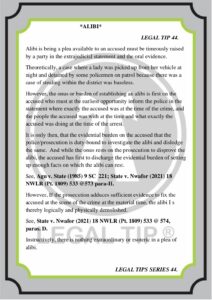Alibi is being a plea available to an accused must be timeously raised by a party in the extrajudicial statement and the oral evidence.
Theoretically, a case where a lady was picked up from her vehicle at night and detained by some policemen on patrol because there was a case of stealing within the district was baseless.
However, the onus or burden of establishing an alibi is first on the accused who must at the earliest opportunity inform the police in the statement where exactly the accused was at the time of the crime, and the people the accused was with at the time and what exactly the accused was doing at the time of the arrest.
It is only then, that the evidential burden on the accused that the police/prosecution is duty-bound to investigate the alibi and dislodge the same. And while the onus rests on the prosecution to disprove the alibi, the accused has first to discharge the evidential burden of setting up enough facts on which the alibi can rest.
See, Agu v. State (1985) 9 SC 221; State v. Nwafor (2021) 18 NWLR (Pt. 1809) 533 @573 para-H.
However, If the prosecution adduces sufficient evidence to fix the accused at the scene of the crime at the material time, the alibi I s thereby logically and physically demolished.
See, State v. Nwafor (2021) 18 NWLR (Pt. 1809) 533 @ 574, paras. D.
Instructively, there is nothing extraordinary or esoteric in a plea of alibi.




